Real Estate App Development Ultimate Guide for Business 2026
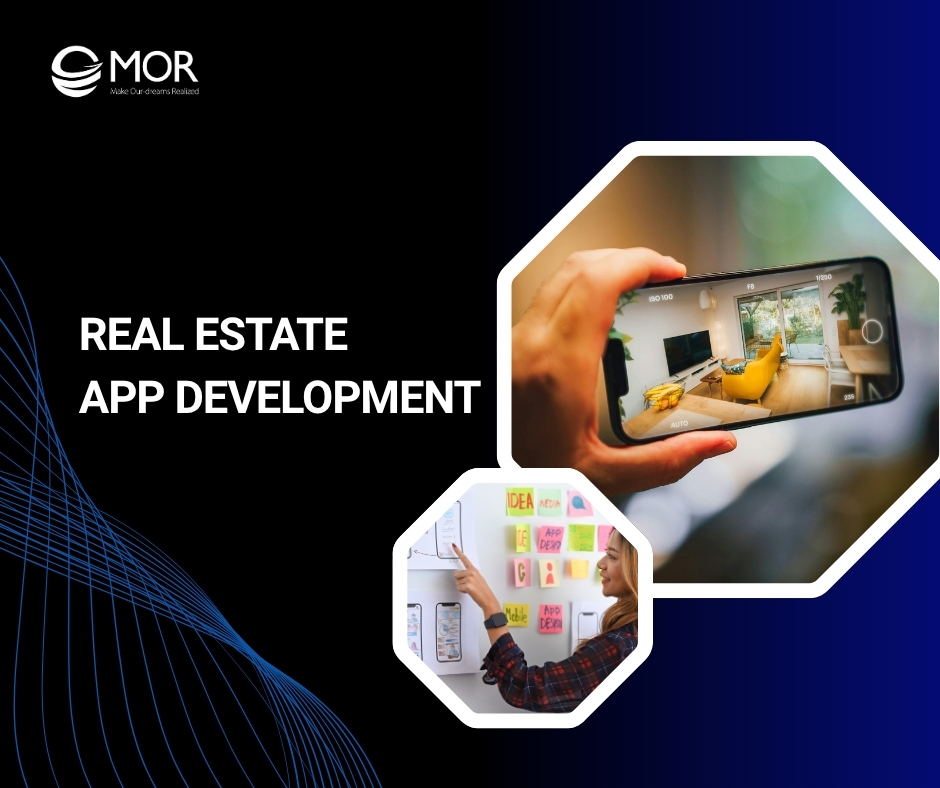
The property market is shifting fast, and businesses are racing to meet digital expectations. Real estate app development is now the key to smarter buying, selling, and property management. This MOR Software’s guide will show how technology, from AI to AR/VR, helps companies build modern real estate platforms that attract users and grow revenue.
What Is Real Estate App Development?
Real estate app development refers to the creation of mobile and web platforms that simplify how people buy, sell, rent, and manage properties. These digital tools connect buyers, sellers, tenants, landlords, real estate agents, and investors in one centralized space, enabling faster communication, easier transactions, and smarter property discovery.
Instead of relying on outdated manual processes, today’s real estate mobile application solutions deliver instant listings, secure payments, and data-driven insights that make decision-making easier for both users and businesses. They’ve become indispensable in an industry where timing and transparency matter most.
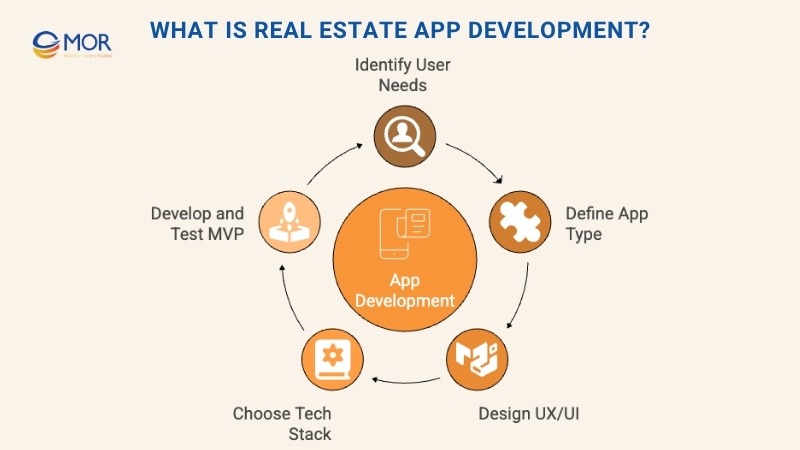
The development process generally involves several key steps:
- Identifying User Needs: Defining whether the target users are homebuyers, renters, agents, or investors. Each group demands unique functionality, such as mortgage estimators for buyers or lease management tools for landlords.
- Defining App Type: Selecting the most suitable format, from marketplaces and wealth management apps to investment tracking or loan calculator apps, based on your goals and audience.
- Designing the UX/UI: Crafting a user experience that feels intuitive, trustworthy, and visually clean. In property-focused apps, credibility and navigation clarity are vital since users are making high-value decisions.
- Choosing the Right Tech Stack: Building a stable foundation using frameworks like React Native or Flutter on the front end, and Node.js or Django on the back end. Security and scalability are non-negotiable, especially when handling sensitive financial data.
- Developing and Testing an MVP: Launching a Minimum Viable Product with must-have functions like search, listings, and login. This early version helps test real demand and refine features before adding complex AI automation tools or AR/VR property previews.
In essence, real estate app development focuses on creating smart, reliable solutions that promote convenience and trust, while giving businesses a competitive edge in attracting and retaining modern property buyers and renters.
Why Invest In Real Estate App Development In 2026?
The global demand for real estate app development is rising faster than ever, making 2026 a turning point for businesses ready to innovate. As convenience, transparency, and mobility reshape buyer expectations, digital platforms now define how people search, compare, and close property deals.
- Mobile-First Property Searches: More than 70% of buyers start their property journey on mobile platforms. Engagement and conversion rates are significantly higher on apps than on traditional websites, showing how deeply users trust mobile experiences.
- Expanding Digital Market: The worldwide property software industry is forecasted to exceed $18 billion by 2027. This growth is fueled by the demand for secure digital transactions and smarter search experiences powered by workflow automation.
- Generational Shift: Millennials and Gen Z will represent roughly 64% of property buyers in 2025. These digital natives expect tools like AI-based recommendations, interactive maps, and immersive viewing options built into every modern app.
- Cross-Border Demand: Global investors now rely on mobile app development for real estate to explore listings, assess market value, and buy properties from anywhere, reducing the need for physical visits.
- Tech-Driven Growth: Advanced technologies such as AI automation, AR/VR, and blockchain are expected to expand at a 20% CAGR, helping businesses deliver more personalized, transparent, and secure property transactions.
In short, investing in real estate app development in 2025 means staying visible, profitable, and relevant in an industry where mobile-first experiences drive every serious property decision.
Benefits Of Real Estate Mobile App Development For All Users
Real estate mobile app development creates value for everyone involved in property transactions, buyers, sellers, and real estate agents. Each group gains specific advantages, from smoother communication and faster sales to better decision-making through digital tools. The table below highlights how these users benefit from using a modern real estate mobile application.
Benefits for Buyers | Benefits for Sellers | Benefits for Real Estate Agents |
Instant access to property listings and property features | Faster sales and improved visibility of listings | Centralized dashboard for client and property data |
Smart filters for tailored search results | Wider audience reach through online promotion | Automated task and lead management |
Direct chat with sellers or brokers | Easier listing uploads and updates | Better customer relationship management |
One app to handle every stage of buying | Digital document and transaction tracking | Increased conversion opportunities |
Comparison tools to evaluate options quickly | Simplified property management | Stronger personal branding |
Guidance on required paperwork | Real-time pricing and status updates | Long-term client engagement and referrals |
Overall, mobile app development for real estate improves convenience, boosts transparency, and strengthens connections between all parties in the property market.
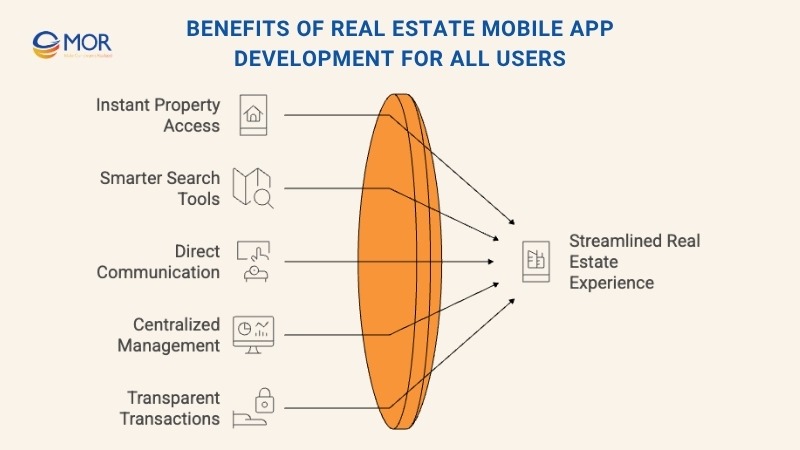
Types Of Real Estate Apps
Real estate mobile app development covers multiple categories depending on the audience, buyers, sellers, investors, landlords, or agents, and the goals of the business. Each type focuses on simplifying a specific stage of the property lifecycle, whether that’s discovery, transaction, or management. These platforms form the backbone of modern real estate app development, driving convenience and transparency across the industry.
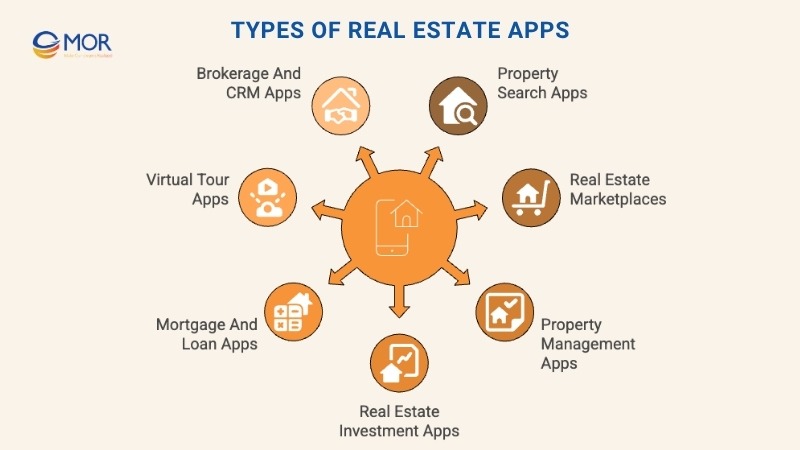
1. Property Search Apps
These solutions are built for homebuyers and renters who want a simple, visual way to explore listings. Popular examples like Zillow or Realtor.com allow users to filter properties by price, location, size, and amenities to find their ideal home quickly.
Key Features: Interactive maps, high-quality images, 3D tours, neighborhood insights, and direct chat with sellers or brokers.
Purpose: To speed up and personalize the search process, giving users an effortless way to find and compare properties that fit their needs.
2. Real Estate Marketplaces
Marketplace platforms unite buyers, sellers, and agents within a single network, offering a complete experience from listing to deal closure. They are a cornerstone of real estate mobile app development, providing users with an all-in-one environment for property trading.
Key Features: Verified listings, agent profiles, secure messaging, payment integration development, property background details, and user reviews.
Purpose: To simplify transactions and build trust by bringing every aspect of the property exchange process into one reliable platform.
3. Property Management Apps
These platforms support landlords, property owners, and real estate firms in handling multiple properties from one place. A well-designed real estate app development project in this category can simplify day-to-day management while improving tenant relations.
Key Features: Digital rent collection, automated payment reminders, tenant screening tools, maintenance tracking, expense management, and digital lease storage.
Purpose: To streamline all property operations within one dashboard, cutting manual work and improving efficiency for property managers.
4. Real Estate Investment Apps
These solutions target investors who want to track, analyze, and expand their real estate portfolios. They transform complex market data into actionable insights.
Key Features: ROI and rental yield calculators, appreciation tracking, smart portfolio analytics, and performance forecasting.
Purpose: To empower investors with accurate data, helping them make smarter investment choices and achieve stronger returns through reliable real estate app development solutions.
5. Mortgage & Loan Apps
These applications focus on simplifying the financing stage of property transactions, giving buyers the tools to plan and manage their home loans effectively. With strong real estate app development, they make complex financial details clear and easy to handle.
Key Features: Mortgage and EMI calculators, affordability assessments, rate comparison dashboards, pre-approval requests, and secure document upload portals.
Purpose: To improve transparency in financing, helping homebuyers and borrowers make confident and informed decisions.
6. Virtual Tour Apps
Built with advanced AR and VR capabilities, these apps let buyers and renters explore properties remotely through immersive visuals. They are a growing part of modern real estate mobile app development, enhancing how users experience listings before making in-person visits.
Key Features: Interactive 3D tours, panoramic viewing modes, virtual staging tools, and room layout visualizations.
Purpose: To reduce site visits, accelerate buying decisions, and create a more engaging and realistic property exploration experience.
7. Brokerage & CRM Apps
These platforms are built for brokers, agencies, and sales teams to manage client interactions, property listings, and deal pipelines all in one place. A well-planned real estate app development project in this category strengthens customer engagement and sales efficiency.
Key Features: Lead tracking systems, automated reminders, marketing and email automation CRM, listing synchronization, and built-in communication channels.
Purpose: To help real estate professionals manage relationships, streamline workflows, and close deals faster with greater accuracy and organization.
Essential Features In Real Estate App Development
“The rising demand from millennials and Gen Z for mobile tools to search and manage rental properties continues to shape the market. These digital-first users expect every step, from browsing to signing a lease, to be fast, intuitive, and fully mobile. To meet those expectations, developers must focus on all-in-one platforms with seamless usability and standout functionality.” - Natalia Ivleva, Business Analyst at SolveIt
So, what makes a real estate app development project truly user-friendly? Below are the foundational features every platform should include.
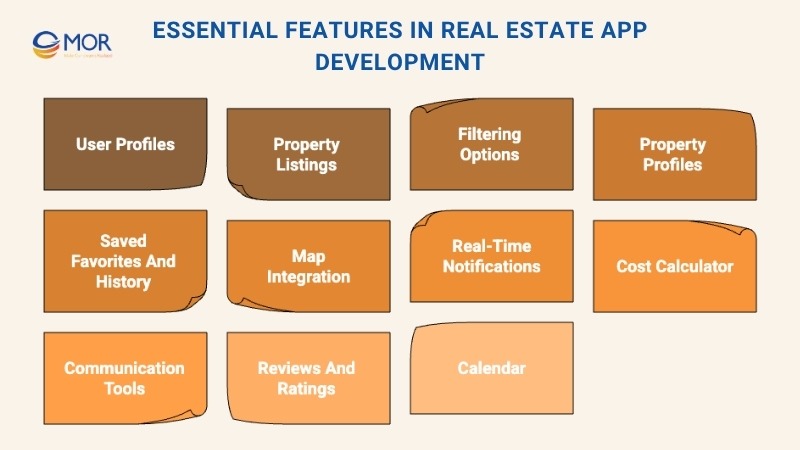
1. User Profiles
Profiles play a central role in real estate app development, creating personalized spaces for buyers, sellers, and agents. They allow users to save preferences, manage searches, and receive tailored property suggestions. For professionals, a well-designed profile becomes a digital portfolio, highlighting expertise, completed deals, and customer feedback that builds trust.
2. Property Listings
Comprehensive listings are the backbone of any property app. They display essential property features such as size, location, price, and amenities, presented in a structured, visual format. When built with clarity and organization, listings help users browse, compare, and evaluate options quickly, making property discovery both simple and engaging.
3. Filtering Options
Smart filters turn a property app into a true discovery engine. Instead of browsing endless listings, users can refine their search by location, price, property type, or specific amenities. This function personalizes the experience, helping users find relevant results faster while cutting down on time and effort. It’s a small feature with a major impact on usability in any real estate app development project.
4. Property Profiles
Property profiles act as detailed digital portfolios for each listing, giving users all the facts they need to make confident decisions. Details such as the number of rooms, layout, nearby facilities, and special amenities make each listing stand out. For developers, structuring this information well is key to showcasing a property’s value and attracting serious buyers or tenants.
5. Saved Favorites & History
The option to save favorite listings and track search history makes property exploration more convenient and strategic. Users can easily revisit their top choices and compare options, while sellers and agents gain valuable insight into customer behavior. These data-driven interactions help refine recommendations and improve the overall experience within real estate app development services.
6. Map Integration
No modern property app is complete without a map. This essential feature brings listings to life by showing their exact location and surroundings. In real estate mobile app development, maps serve as an intuitive guide, allowing users to explore properties based on proximity to schools, public transport, shopping centers, and other key landmarks. It turns location data into a visual experience that builds confidence in every decision.
7. Real-Time Notifications
Instant alerts help users stay ahead in the competitive housing market. Real-time notifications update them on new listings, price adjustments, or inquiries from other parties. This function keeps communication active and ensures no opportunity slips through the cracks. For agents, it’s a simple yet effective way to maintain engagement and close deals faster.
8. Cost Calculator
Including a cost calculator adds real value to real estate app development, helping users understand the financial side of property transactions. A detailed calculator can estimate moving costs, mortgage payments, taxes, and other related expenses, making budgeting more transparent. The more accurate the projection, the easier it is for buyers to plan confidently and make well-informed financial decisions.
9. Communication Tools
Smooth communication lies at the heart of real estate mobile app development. Adding in-app chat, inquiry forms, or callback scheduling transforms an app into a dynamic interaction hub rather than just a listing platform. These tools enable buyers and sellers to connect instantly, ask questions, share feedback, and negotiate directly, making the property journey faster and more transparent.
10. Reviews & Ratings
Trust is everything in property transactions, and reviews help build it. Ratings and testimonials create a community-driven experience where users can learn from others’ interactions with specific properties, sellers, or agents. For professionals, these reviews motivate consistent service quality and strengthen reputation within the app’s ecosystem.
11. Calendar
A built-in calendar keeps the buying and selling process organized and stress-free. It helps users manage property tours, agent meetings, and upcoming deadlines in one place. With automated reminders and scheduling, this feature ensures that no appointment or milestone is overlooked, a simple yet impactful tool in real estate app development.
Advanced Features For Modern Real Estate App Development
After establishing the basics, the next step in real estate app development is to integrate advanced capabilities that elevate user experience and streamline operations. These additions not only enhance functionality but also make the app stand out in a competitive market.
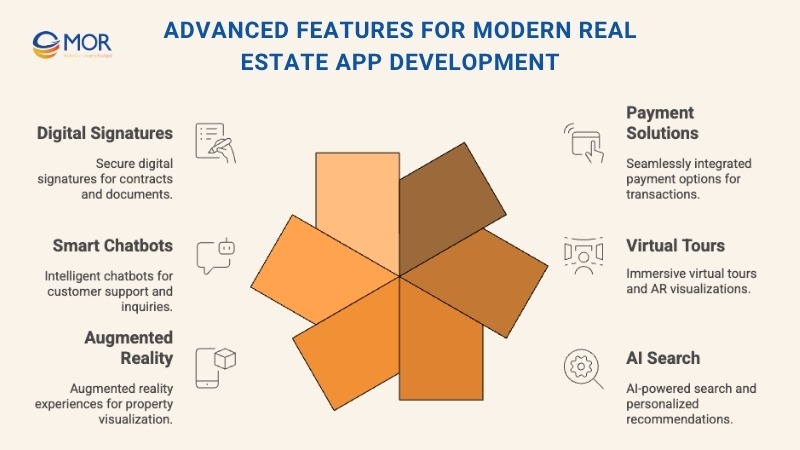
Integrated Payment Solutions
Secure and seamless payment options are now standard expectations in digital property platforms. Integrating payment gateways allows users to handle deposits, rent, or service fees directly within the app. This function simplifies transactions, builds trust, and delivers a smooth, end-to-end experience without switching to external tools.
Virtual Tours and AR Visualization
Immersive 360-degree tours bring listings to life, letting users explore homes remotely in real time. With AR and VR technology, buyers and renters can visualize interiors, walk through rooms, and evaluate layouts from their devices. This feature is especially valuable for busy professionals or large real estate firms that need quick, confident decisions without multiple on-site visits.
AI-Powered Search and Recommendations
Integrating predictive machine learning algorithms powered by machine learning can greatly enhance real estate app development outcomes. These systems analyze each user’s search patterns, preferences, and viewing history to suggest the most relevant properties, price ranges, and locations. You can also enrich the experience with neighborhood insights that display data on schools, safety, amenities, and average home values. This level of personalization makes the property discovery process faster, smarter, and more engaging.
Augmented Reality (AR)
AR integration allows users to personalize how they view a property. By overlaying digital elements onto real spaces, buyers or renters can visualize furniture placement, interior design choices, and layout changes directly through their devices. This technology helps users picture their future home without visiting in person, making decisions more confident and informed. It’s a strong differentiator in modern real estate mobile app development projects.
Smart Chatbots
AI-driven chatbots have become an integral part of real estate app development, offering users instant and personalized support. These virtual assistants can answer questions, guide buyers through listings, suggest suitable properties, and even schedule viewings in real time. By acting as intelligent digital agents, chatbots make property search and rental experiences faster, smoother, and more interactive, reducing the need for constant human intervention.
Digital Signatures
Built-in e-signature functionality eliminates the hassle of handling physical paperwork. Users can securely review and sign agreements, leases, or sales contracts directly within the app. This digital process not only speeds up transactions but also ensures security and compliance, making it an essential addition to any modern real estate app development services.
Top 5 Reasons To Invest In Real Estate App Development
In 2025, real estate app development is more than a passing tech trend, it’s a strategic move for long-term growth. Below are the main reasons businesses are prioritizing this investment:
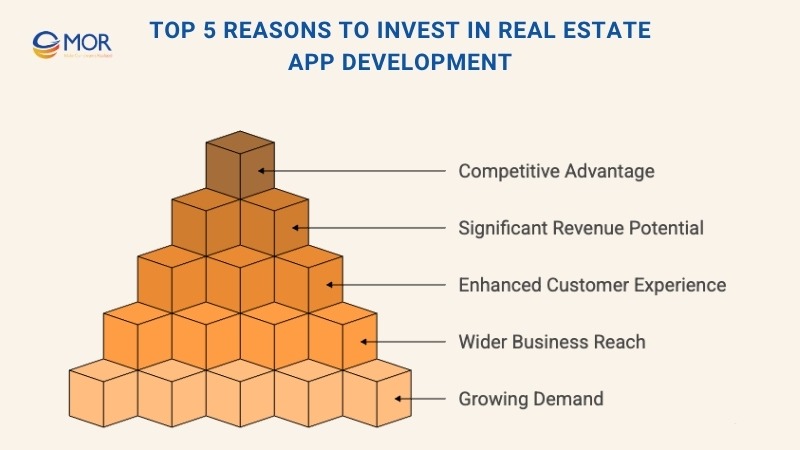
- Growing Demand: Most property buyers and renters now begin their journey online, with mobile apps at the center of that shift. As smartphone usage continues to rise, users expect fast, convenient, and mobile-first access to listings, making apps far more appealing than traditional search channels.
- Wider Business Reach: Unlike offline brokers or local agencies, digital platforms allow companies to connect with global buyers, sellers, and investors. Features like multilingual listings and regional filters help businesses attract audiences across borders, expanding visibility and market share.
- Enhanced Customer Experience: Real estate apps make searching, buying, and renting simple. With AI recommendations, virtual tours, and instant messaging, users enjoy a seamless experience that builds trust and strengthens long-term relationships.
- Revenue Potential: Developing an app creates multiple income opportunities, including featured listings, subscription plans for agents, advertisements, and transaction commissions. These steady revenue streams make apps a scalable business asset.
- Competitive Advantage: Companies that adopt mobile-first real estate app development solutions stand out from traditional brokers. By integrating AI, AR/VR, and analytics, they deliver smarter user experiences and establish stronger brand credibility in a competitive marketplace.
How To Build A Real Estate App: Step-by-Step
Creating a successful real estate app development project in 2026 requires more than just coding, it’s about designing a secure, intuitive, and high-value product that meets the needs of buyers, sellers, investors, and agents alike. The process involves strategic planning, the right technology, and a user-first mindset. Here’s a practical roadmap from concept to launch.
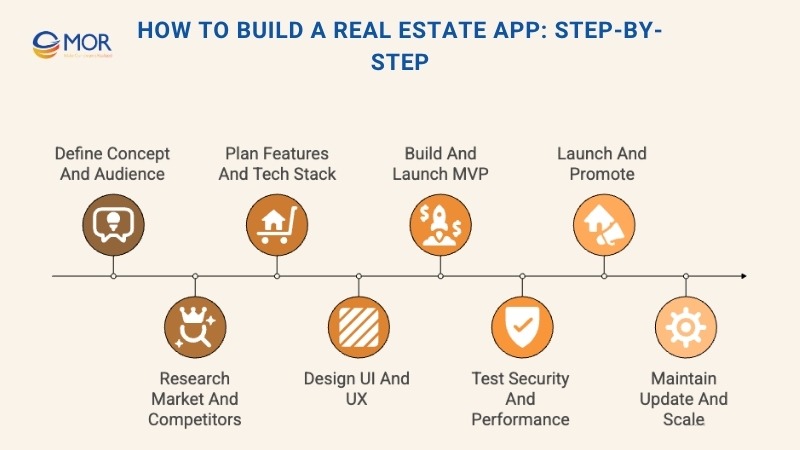
1. Define the App Concept and Target Audience
Every great app begins with a clear purpose. Identify the core problem your platform will solve and define who it’s built for.
Target Users: First-time homebuyers, tenants, property owners, real estate agents, or investors.
Example: A landlord-focused app should include rent management, payment tracking, and tenant verification, while an investment-based platform might highlight ROI tracking and portfolio analytics.
Goal: Clarity at this stage helps you create a real estate app that delivers targeted solutions instead of trying to satisfy every market segment at once.
2. Research the Market and Analyze Competitors
Before moving into development, study the market thoroughly to understand user expectations and industry standards. Look into major players like Zillow, Redfin, Realtor.com, MagicBricks, and 99acres to see what attracts users, and where those apps fall short.
Study User Feedback: Explore reviews to uncover common frustrations or missing features that users want improved.
Evaluate Business Models: Review how different platforms earn revenue, from subscriptions and in-app ads to transaction commissions.
Goal: Identify market gaps, validate demand, and define how your real estate app developer team can introduce something fresh that sets your solution apart.
3. Plan Core Features and Select the Tech Stack
After defining your audience and studying competitors, outline the core elements your app will include. A well-structured plan ensures smooth development and scalability from day one.
Essential MVP Features: Property listings, advanced filters, image galleries, map view, user registration, and messaging tools.
Advanced Add-Ons: AI-based suggestions, AR/VR property tours, predictive pricing models, mortgage calculators, and integrated payments for secure transactions.
Suggested Tech Stack:
- Frontend: React Native or Flutter for cross-platform support
- Backend: Node.js, Django, or Ruby on Rails
- Database: PostgreSQL, MongoDB, or Firebase
- Cloud Hosting: AWS, Google Cloud, or Firebase
Goal: Focus on must-have features for your first release, and choose a stack that supports flexibility and future growth in real estate app development.
4. Design a Simple and Trustworthy UI/UX
Because property transactions involve major financial commitments, clarity and confidence are essential in real estate app development. The interface should guide users naturally and make every interaction feel reliable.
UI Priorities: Use a clean, modern design with consistent branding, readable typography, and responsive layouts that look great on any device.
UX Priorities: Focus on easy navigation, quick onboarding, minimal loading times, and trust-building details like verified listings and agent ratings.
Goal: Create a smooth, intuitive experience that keeps users engaged, builds credibility, and drives more successful transactions.
5. Build and Launch the MVP (Minimum Viable Product)
Rather than developing the full platform immediately, start with a focused version that highlights your app’s key purpose. This approach is a cornerstone of successful real estate app development.
Focus: Include only the essential features needed to solve the main user problem, such as listings, filters, messaging, and profiles.
Benefits: Quicker launch, reduced upfront costs, and valuable early insights from actual users.
Goal: Test your idea in real conditions, refine based on feedback, and confirm demand before expanding with advanced functionality.
6. Test for Security, Performance, and Scalability
Thorough testing is vital in real estate app development, especially when the platform manages sensitive user information and financial transactions. Reliability builds trust and protects your brand reputation.
Security: Implement end-to-end encryption, two-factor authentication, and trusted payment systems like Stripe or PayPal to safeguard user data.
Performance: Evaluate speed, responsiveness, and media loading times to guarantee a seamless experience across all devices.
Scalability: Run stress tests to simulate high traffic and confirm the app can grow with increasing users and listings.
Goal: Deliver a secure, high-performing, and scalable app that’s ready for long-term success.
7. Launch and Promote the App
Once testing confirms your platform is stable, the next phase of real estate app development is launching and driving visibility. A strong release strategy ensures your app reaches the right audience from day one.
Distribution: Publish on the App Store, Google Play, and consider adding a web-based version for wider access.
Promotion Strategies:
- Optimize listings through App Store Optimization (ASO)
- Run targeted social media and digital ad campaigns
- Collaborate with real estate agents and property firms for cross-promotion
- Offer referral programs or sign-up bonuses to encourage downloads
Goal: Create momentum, attract initial users, and collect early feedback to refine your app post-launch.
8. Maintain, Update, and Scale with Emerging Technology
The launch is only the first milestone in real estate app development. Continuous updates and innovation ensure your app stays relevant and competitive as user needs evolve.
Monitor: Track engagement and performance with analytics tools like Mixpanel or Google Analytics to understand how users interact with your app.
Update: Release regular improvements to fix bugs, refine the interface, and introduce features based on real user feedback.
Innovate with Advanced Tech:
- AI: For tailored property recommendations and dynamic pricing models
- AR/VR: For immersive virtual tours and interactive viewing experiences
- Blockchain: For secure property records and smart contract automation
Goal: Maintain a modern, scalable platform that evolves with technology and continues to deliver value to users.
Challenges In Real Estate App Development
Developing a property platform offers major opportunities but also presents complex challenges that can affect long-term growth. Overcoming these obstacles is crucial to building a reliable and competitive solution in real estate app development.
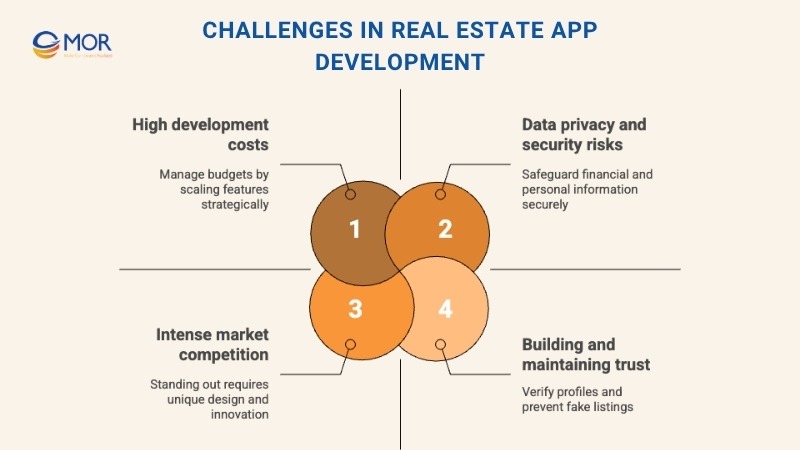
1. Intense Market Competition
The real estate app space is crowded with established names such as Zillow, Redfin, Realtor.com, MagicBricks, and 99acres. To attract users, new entrants must focus on innovation, niche positioning, and superior design. Without a clear differentiator or strong value proposition, earning market share and user loyalty becomes difficult.
2. Data Privacy and Security Risks
These apps manage sensitive information including financial details, property ownership records, and personal identification. Protecting this data is essential. End-to-end encryption, GDPR/CCPA compliance, secure payments, and two-factor authentication should be built into every real estate mobile app development company project to ensure user trust.
3. High Development and Maintenance Costs
Advanced features such as AI-based recommendations, AR/VR tours, and blockchain-enabled smart contracts can significantly increase expenses. Businesses should manage budgets carefully by starting with an MVP and expanding features gradually as the app gains traction.
4. Building and Maintaining User Trust
Fake listings and unverified agents remain ongoing issues in property platforms. Establishing credibility requires verified profiles, transparent reviews, secure payments, and AI-based fraud detection. Apps that emphasize authenticity and safety gain higher adoption rates and long-term user confidence.
Recommended Tech Stack For Real Estate App Development
Selecting the right technology stack is critical for building a secure, high-performing, and scalable property platform. The stack should support seamless performance, easy integration, and flexibility for future updates. Here’s a recommended structure for real estate app development in 2026.
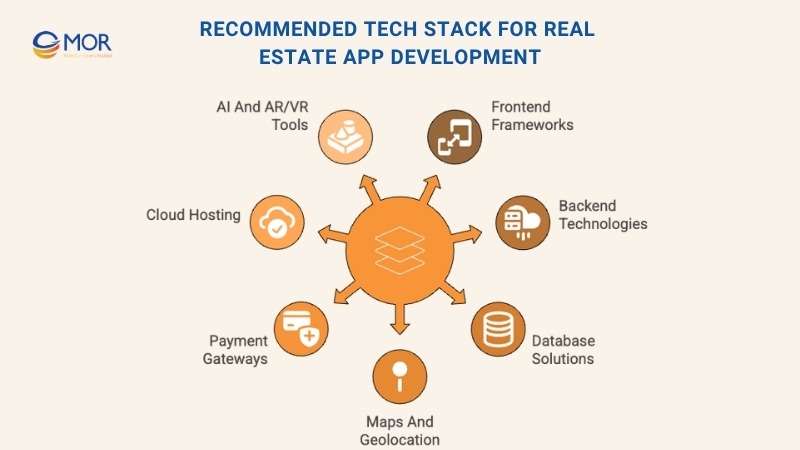
Frontend (User Interface): React Native, Flutter
For cross-platform real estate app development, React Native and Flutter allow you to build for both iOS and Android from a single codebase. This approach reduces costs and accelerates delivery while maintaining a smooth, native-like experience.
Backend (Server-Side): Node.js, Django, Ruby on Rails
The backend handles listings, authentication, messaging, and transactions. Node.js is ideal for real-time features like chat or notifications. Django strengthens security, while Ruby on Rails supports rapid MVP development and prototyping.
Database: PostgreSQL, MongoDB, Firebase
A strong database ensures stability when managing property data, user profiles, and transaction records. PostgreSQL handles relational data efficiently, MongoDB manages unstructured assets such as images, and Firebase enables real-time data syncing.
Maps and Geolocation: Google Maps API, Mapbox
Location drives value in real estate. Integrating Google Maps API or Mapbox helps users view listings, estimate commute times, and explore nearby services like schools, restaurants, and hospitals.
Payments and Transactions: Stripe, PayPal, Razorpay
A secure payment gateway is essential for deposits, bookings, and subscriptions. Stripe and PayPal work well globally, while Razorpay is a trusted option for the Asian market.
Cloud Hosting and Scalability: AWS, Google Cloud, Azure
Cloud platforms such as AWS, Google Cloud, and Azure ensure reliability, speed, and scalability. They also provide built-in tools for analytics, AI, and data storage to keep your app future-ready.
AI, AR/VR, and Emerging Tech: TensorFlow, OpenAI API, ARKit, ARCore
Tools like TensorFlow and OpenAI API enhance personalization, property valuation, and chatbot experiences. ARKit (iOS) and ARCore (Android) bring immersive 3D home tours to life, offering users a realistic way to explore spaces remotely, an increasingly valuable feature in modern real estate app development solutions.
How Long Does Real Estate App Development Take?
Once your feature list and design requirements are finalized, it’s time to begin the actual real estate app development process. The best approach is to start with an MVP (Minimum Viable Product), which focuses only on the core functionality needed to test your concept. After confirming market interest and user adoption, you can scale the app with additional tools like cost calculators, AR/VR tours, or AI-based recommendations.
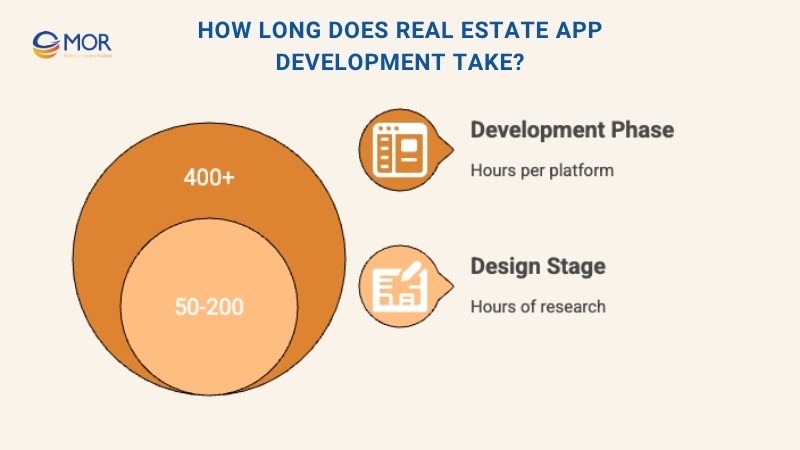
The design stage, which includes research, wireframing, prototyping, and UI/UX creation, typically takes between 50 and 200 hours, depending on complexity.
To develop and implement the final product, expect a minimum of 400 development hours per platform. You can choose between native development (creating separate iOS and Android apps) or cross-platform frameworks such as Flutter or React Native, which save time and cost by supporting both systems with a single codebase.
Ultimately, the total timeline depends on your project’s scope, tech stack, and desired features, but planning an MVP first ensures faster delivery and a lower initial investment.
Real Estate App Development Cost In 2026
The total real estate app development cost depends on several key factors, from functionality and platform choice to design quality and ongoing maintenance. Below is a breakdown of what typically influences the overall budget.
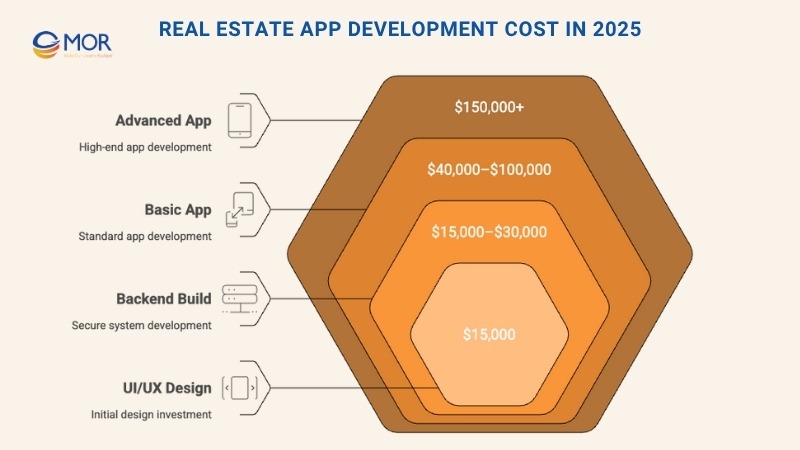
- Feature Complexity. A standard property app with essentials like listings, filters, and messaging usually ranges between $40,000 and $100,000. Adding premium features such as AR/VR tours, predictive search, secure payments, or AI recommendations can increase costs to $150,000 or more.
- Platform Choice. Building for both iOS and Android separately is more expensive than using cross-platform frameworks like Flutter or React Native. Optimizing for different screen sizes and devices also adds to development hours and testing costs.
- UI/UX Design. High-quality design, including research, wireframing, and prototyping, typically starts from $15,000. Good design is an investment, it directly impacts engagement and conversion rates.
- Backend Development. A strong backend system handling listings, authentication, maps, and payments can cost between $15,000 and $30,000, depending on integrations and data volume.
- Maintenance and Updates. Continuous support and updates usually require 15–25% of the initial budget each year to keep the app secure, up to date, and competitive.
When evaluating these components early, businesses can set realistic budgets and timelines for their real estate app development projects, ensuring smooth delivery and long-term sustainability.
Real Estate App Development Success Stories
Examining top-performing property platforms reveals how smart real estate app development can reshape the way people buy, rent, and invest in homes. Here are a few standout examples that continue to inspire innovation in the industry.
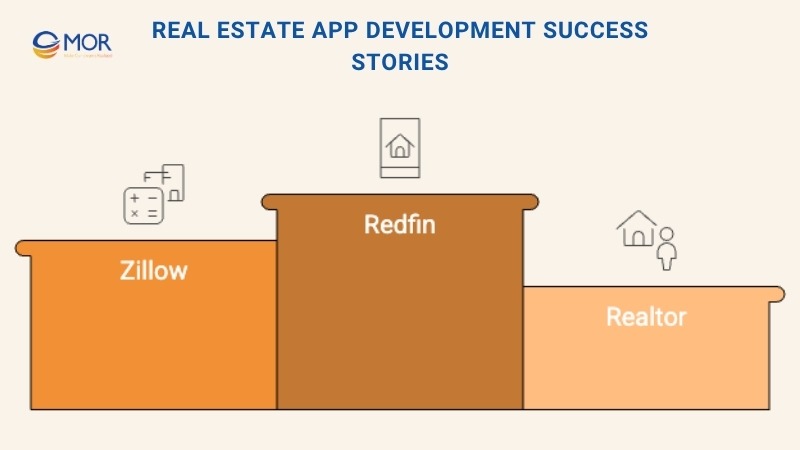
Zillow and Realtor.com: These market leaders revolutionized property search with advanced filtering, valuation tools, and instant connections to verified agents. Their focus on transparency and usability set the benchmark for digital property discovery.
Redfin: Gained a competitive edge by combining online listings with professional agent services, offering a more transparent and data-driven buying experience. This hybrid model built stronger trust among both buyers and sellers.
Airbnb: Demonstrated how niche-based real estate platforms can create entirely new markets. By focusing on short-term rentals, it turned individual properties into profitable assets and inspired countless imitators.
Paranova Property Buyers (Fictional Example): Showcases how new entrants can thrive through specialization. By targeting overseas investors looking for verified listings and expert support, the platform highlights how focused real estate app development solutions can capture unique audience needs.
Emerging Trends In Real Estate App Development For 2026
As technology continues to evolve, businesses must constantly upgrade their real estate app development strategies to stay competitive. Modernizing existing software is no longer optional, it’s essential for improving efficiency and meeting changing user expectations. The year 2025 promises major advancements that will redefine how property apps operate and deliver value.
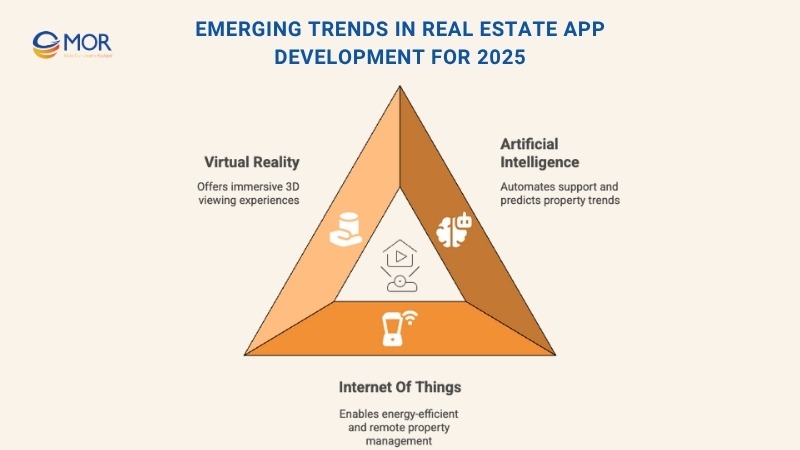
Artificial Intelligence (AI)
AI remains one of the most powerful drivers of innovation in web3 real estate app development and beyond. Its practical applications improve personalization, automate complex tasks, and speed up data-driven decisions. Integrating AI can significantly boost user experience and operational performance.
Key AI-powered opportunities include:
- Virtual assistants and smart chatbots for instant customer support
- AI-based property recommendations with accurate price forecasting
- Predictive investment analysis for higher returns
- Big data analytics for trend identification and risk assessment
- Automated document handling and workflow optimization
Implementing these tools, companies not only enhance convenience but also strengthen their market position with measurable, high-performing digital solutions.
Internet of Things (IoT)
The integration of IoT into real estate app development enables remote monitoring, automation, and control of key property functions, all from a single digital platform. This technology is transforming property management by making homes and buildings smarter, safer, and more energy-efficient.
Here’s how IoT brings real value to the real estate industry:
- Enhanced Security: Smart locks, motion sensors, and video surveillance systems improve safety by allowing homeowners and managers to control and monitor access remotely.
- Energy Efficiency and Cost Savings: Automated control of lighting, heating, and air conditioning reduces unnecessary energy use, cuts costs, and supports eco-friendly living.
- Remote Property Management: Through mobile apps, users can manage connected devices from anywhere, adjusting settings, monitoring systems, or responding to alerts in real time.
In short, IoT-powered real estate app development makes property management more efficient and user-centric, blending convenience with sustainability.
Virtual Reality (VR)
Virtual Reality has moved beyond being a trend, it’s now a powerful, practical tool that enhances how real estate businesses connect with clients. Integrating VR into real estate app development allows companies to deliver immersive property experiences that increase engagement and streamline operations.
Here’s how VR adds measurable value:
- Immersive Viewing: VR tours offer a full spatial experience, giving potential buyers or renters a true sense of the property beyond static images.
- Reduced Site Visits: By enabling virtual showings, businesses can focus on serious buyers, saving time and resources.
- Lower Operational Costs: Agencies can minimize travel and staging expenses while maintaining a high-quality customer experience.
- Showcasing Unfinished Projects: Developers can present under-construction or planned properties with realistic 3D walkthroughs to attract early buyers.
This forward-thinking approach in real estate app development expands audience reach, enhances sales efficiency, and provides clients with a more engaging and transparent way to explore properties.
Real Estate App Development [MOR Software’s Expertise]
MOR Software delivers custom real estate app development services that help property businesses grow faster. Our solutions connect buyers, sellers, and agents through secure, user-friendly, and data-driven platforms built to scale.
![Real Estate App Development [MOR Software’s Expertise]](https://prod-mor-global-website.s3.ap-southeast-1.amazonaws.com/1767842479066image.jpeg)
- Strategic Consulting: We analyze your business goals to design the right architecture, feature set, and monetization model.
- Intuitive UX/UI Design: Our design team creates smooth, reliable interfaces that build trust and improve engagement.
- Agile Development: We follow Agile and Scrum to accelerate delivery, ensure transparency, and adapt quickly to your needs.
- Modern Tech Stack: Using fastest programming languages React Native, Flutter, Node.js, Django, and AWS, we create apps that are fast, secure, and scalable.
- Advanced Features: We integrate AI recommendations, AR/VR virtual tours, chatbots, and analytics dashboards for smarter user experiences.
- Quality Assurance: Our ISTQB-certified testers guarantee your app performs seamlessly under all conditions.
- Continuous Support: We handle updates, monitoring, and maintenance to keep your app competitive after launch.
From real estate marketplaces to property management tools, we help clients worldwide turn digital ideas into practical, high-performing applications.
Contact us to build your next real estate app with confidence.
Conclusion
In 2026, real estate app development is reshaping how people buy, sell, and manage properties. Businesses that embrace digital transformation gain stronger visibility, higher efficiency, and lasting customer trust. With deep industry knowledge and proven expertise, MOR Software builds secure, scalable, and innovative real estate platforms tailored to your goals. Ready to bring your idea to life? Contact us today to start building a smarter, more profitable real estate app.
MOR SOFTWARE
Frequently Asked Questions (FAQs)
What’s the difference between a property marketplace app and a management app?
A marketplace app connects buyers and sellers, while a management app focuses on rental tracking, maintenance, and tenant management.
How often should a real estate app be updated?
Apps should be updated every few months to fix bugs, add new features, and stay compatible with the latest devices and OS versions.
What is real estate app development?
Real estate app development involves creating digital platforms that help users buy, sell, rent, or manage properties through mobile or web applications.
How long does it take to develop a real estate app?
A basic app usually takes around 4–6 months, while feature-rich platforms with AI, AR/VR, or payment integration may take 8–12 months.
What are the key features of a real estate app?
Essential features include property listings, advanced filters, map integration, chat support, virtual tours, push notifications, and secure payment options.
Which technologies are best for real estate app development?
Common technologies include React Native or Flutter for the frontend, Node.js or Django for the backend, and AWS or Google Cloud for hosting.
How do real estate apps make money?
Popular monetization models include paid listings, in-app advertising, subscription plans, and commission-based transactions.
Are real estate apps secure for online transactions?
Yes. Modern apps use encryption, two-factor authentication, and secure payment gateways like Stripe or PayPal to protect user data.
Can real estate apps include virtual tours?
Absolutely. AR and VR technologies allow users to explore properties remotely with 3D walk-throughs and interactive layouts.
Rate this article
0
over 5.0 based on 0 reviews
Your rating on this news:
Name
*Email
*Write your comment
*Send your comment
1